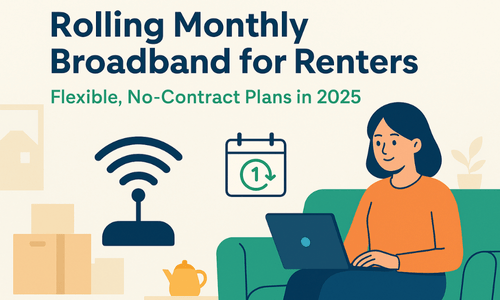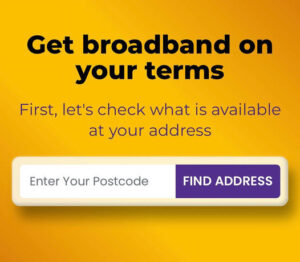Why Renters in the UK Should Choose Rolling Monthly Broadband Contracts in 2025

Estimated reading time: 14 minutes
Summary
- Renters need flexibility, and rolling monthly broadband offers freedom from long contracts and hidden fees.
- In 2025, broadband providers introduced no-contract and 1-month rolling broadband deals tailored for renters.
- Use the Broadband Comparison tool to explore options and find the best deals that fit your rental situation.
- When choosing rolling monthly broadband, prioritize speed, no landline requirements, low setup fees, and flexible contract lengths.
- Broadband should match your lifestyle; whether you’re moving often or settling down, ensure your broadband plan adapts to your needs.
Table of contents
- Renting and Monthly Rolling Broadband
- Why Renters Need Different Broadband Thinking
- What Is a Rolling Monthly Broadband Contract?
- What Features Renters Should Compare Before Choosing
- How to Compare Broadband Deals as a Renter (And Find the One That Fits You)
- Final Thoughts: Broadband Freedom Means Real Freedom
Renting and Monthly Rolling Broadband
If you’re a renter searching for rolling monthly broadband for renters, you’re not just shopping for Wi-Fi. You’re looking for freedom.
Freedom from long contracts; from hidden fees. Freedom from waiting weeks for installation when you’ve just moved into a new flat.
Because let’s face it: renting comes with enough uncertainty already — new landlords, short leases, deposit worries, and sometimes… walls that block every signal known to man.
So when it comes to broadband, flexibility isn’t a “nice-to-have.”
It’s a necessity.
The good news? In 2025, the broadband market finally caught up with the renter lifestyle.
Providers now offer no-contract and 1-month rolling broadband deals, giving you the same superfast speeds and reliability as long-term plans, without locking you in.
You can explore these options directly on our Compare 1-Month Rolling Broadband page, where we list providers that let you join, upgrade, or leave whenever you want.
And if you’re the kind of person who likes to see all your options before deciding, the Broadband Comparison tool gives you every deal available at your postcode, from full-fibre speeds to budget-friendly bundles.
Here’s what we’ll unpack in this renter-friendly guide:
- Why renting and broadband don’t always play nice, and what to do about it
- The pros and cons of rolling monthly contracts vs 12-, 18-, or 24-month ones
- How to find flexible broadband plans that move with you
- What to look for in no-contract broadband (and what traps to avoid)
- And how to switch providers with zero downtime
We’ll also link to helpful guides like How to Switch Broadband Provider, because when your move-in date is stressful enough, the last thing you need is Wi-Fi drama.
This isn’t a techy sales pitch.
It’s a straight-talking guide for real people, students, professionals, families, who rent, move often, and need internet that fits their lifestyle.
So grab a coffee, open your moving checklist, and let’s walk through why rolling monthly broadband for renters is the most flexible (and surprisingly affordable) way to stay connected in 2025.
Why Renters Need Different Broadband Thinking
Let’s be honest, renting can be a juggling act.
You’ve got boxes everywhere, new keys in your pocket, and a to-do list that won’t quit.
And somewhere between “set up council tax” and “buy another kettle,” there’s the one thing you absolutely need working yesterday: the Wi-Fi.
Now, if you own your home, broadband is easy. You pick a 24-month deal, plug it in, and forget about it.
But for renters?
That same deal can feel like a trap.
Why? Because life as a renter changes fast.
You might move cities next year; you might not renew your lease; you might have a landlord who says, “Sorry, you can’t drill holes for the fibre cable.”
And that’s exactly why rolling monthly broadband for renters exists to give you options, not obstacles.
1. The short-lease problem
Most UK rental agreements last between 6 and 12 months.
So why should your broadband lock you in for twice that long?
When you sign a 24-month deal, you’re basically paying for a service that might not even reach your next address.
That’s where 1-month rolling broadband deals come in handy.
They let you cancel or switch at any time, with no exit fees.
So if you’re moving, you’re not wasting money on months you can’t use.
It’s the kind of flexibility renters have been waiting for.
2. The “I just moved in” frustration
If you’ve ever moved into a flat with no broadband, you know the pain:
You try to book an installation, and they say, “Our next available slot is in two weeks.”
Meanwhile, you’re tethering your phone, your Netflix keeps buffering, and you’ve eaten through your mobile data by lunchtime.
Sound familiar?
That’s why it pays to plan.
You can use our Broadband Comparison tool to check which providers serve your new postcode before you even move in.
That way, you’ll know exactly who can connect you fastest, and which ones offer instant activation or no setup fees.
This simple step saves you days (and a lot of stress).
3. The hidden costs no one talks about
Here’s a big one: setup fees.
Many renters end up paying them twice, once when they start their contract and again when they move.
But with flexible broadband, those costs often disappear.
Most no-contract broadband plans come with no installation charge and use existing lines.
And if you choose a provider that doesn’t require a landline (like many listed on our Broadband Without Landline Phone page), you’ll save even more.
No landline, no setup, no waiting, just plug in and go.
4. Landlords, permissions, and reality checks
Now, let’s talk about landlords, because they’re part of this story too.
If your property doesn’t already have full-fibre, some landlords hesitate to approve installations.
They worry about cables, drilling, or “modifications.”
The workaround?
Choose a broadband provider that uses your existing connection, no drilling, no disruption.
You can filter for these options on our Broadband Providers page, where we’ve listed who offers plug-and-play or self-install broadband.
It’s one of those small details that can make a huge difference when you’re renting.
5. Your needs change: your broadband should too
Maybe you’re living solo this month and house-sharing next year.
Maybe your new job means more video calls.
Or maybe you’ll move into a place with better fibre availability.
Either way, you shouldn’t be stuck with a broadband plan that doesn’t fit anymore.
That’s the beauty of rolling monthly deals: they grow with you.
You can upgrade your speed, switch providers, or even pause your plan without penalty.
And when your circumstances change (and they will), you’re not tied to yesterday’s contract.
So yes, renters really do need a different broadband mindset.
Not because renting is complicated, but because life moves fast.
And broadband should keep up.
What Is a Rolling Monthly Broadband Contract?
Let’s clear this up right away: a rolling monthly broadband contract is exactly what it sounds like: broadband you can keep for as long as you want and cancel when you don’t.
No strings, No penalties, No “sorry, you still owe us nine months of payments.”
It’s broadband on your terms, which, let’s be honest, is how renting life should be.
1. How it works, simple and flexible
When you sign up for a rolling monthly deal, you’re paying month-to-month instead of locking in for 12, 18, or 24 months.
That means your contract automatically renews each month unless you choose to leave.
No scary renewal letters. No sneaky price jumps you didn’t see coming.
You can compare these flexible deals right now on our 1-Month Rolling Broadband page, which lists the top UK providers who specialise in short-term broadband with fair pricing and zero-exit-fee policies.
The whole idea is control. You’re in charge, not the contract.
2. Why renters love it
Rolling monthly broadband is designed for people whose lives don’t fit into tidy timelines.
Students on short leases.
Professionals on temporary contracts.
Families are waiting for a permanent home.
You can set it up fast, use it for as long as you need, and cancel when you move.
It’s that easy.
And if you’re planning for your next move, you can use our Broadband Comparison tool to check speeds and availability at your next address, too, so your new place is ready to stream from day one.
3. The cost question: Is it more expensive?
Good question.
Yes, month-to-month broadband can look slightly pricier at first glance.
But here’s the truth: the higher monthly rate usually saves you money overall.
Why?
Because you’re not paying exit fees, setup costs, or inflated renewal prices.
You only pay for the time you actually use the service.
Plus, many no-contract broadband options now come with free routers and self-install kits, so there’s no hidden cost of switching later.
Think of it like renting a flat: flexibility costs a little more upfront, but saves you loads of hassle when life changes.
4. The speed and reliability myth
Some people still believe rolling broadband = slower speeds.
That’s old-school thinking.
Today’s flexible plans use the same full-fibre technology as long-term contracts.
You’ll get identical performance, just without the 24-month lock-in.
If you’re not sure what “good speed” looks like for your household, check out our Ultimate Guide to Internet Speed Test.
It’ll help you test your current connection and understand what Mbps you really need (streaming, gaming, or working from home).
5. When a rolling contract isn’t right
To be fair, there are times when a longer contract makes more sense.
If you’re settled long-term, or if you’re bundling broadband with TV, you’ll usually get better value on a 12-month Broadband Package.
That’s the key, knowing your situation.
If you move often, choose flexibility.
If you’re staying put, choose savings.
Simple as that.
6. Real talk: how to cancel
One of the best parts of rolling monthly broadband is how easy it is to leave.
Most providers only need 30 days’ notice. You can cancel online, by phone, or even through your account dashboard.
You’ll find a step-by-step explanation in our How to Switch Broadband Provider guide, which covers everything from notice periods to avoiding downtime between connections.
So whether you’re upgrading, relocating, or just taking a break from renting, you’re free to move on your schedule.
Rolling monthly broadband isn’t just a plan, it’s peace of mind.
You get the same high-speed internet everyone else does, without being tied to a single postcode or provider.
What Features Renters Should Compare Before Choosing
So, you’ve decided you want rolling monthly broadband for renters, smart move.
But before you click “order now,” there’s one thing I want you to remember: not all flexible broadband deals are created equal.
Some are brilliant.
Others… will have you pulling your hair out before your router even arrives.
Let’s walk through what actually matters, the features that make the difference between smooth streaming and constant frustration.
1. Speed that matches your lifestyle
Here’s a quick reality check:
You don’t need gigabit broadband if you’re living alone and only stream Netflix at night.
But if it’s a house share with four people, all working remotely and gaming in the evenings? You’ll need serious bandwidth.
A good benchmark looks like this:
- Single renter or couple: 50–100 Mbps
- House share (3–5 people): 150–300 Mbps
- Heavy users (gamers, streamers, remote work): 300 Mbps+
You can test your current connection using our Ultimate Guide to Internet Speed Test. It’ll show you not just numbers, but what those speeds mean for real life.
Think of it this way, if your broadband were a car, would you rather have a reliable hatchback that fits your commute, or a sports car that guzzles petrol for no reason?
Same idea here. Choose what fits your lifestyle, not what sounds flashy.
2. No landline required (because who still uses one?)
If you’ve rented recently, you’ve probably noticed this: most modern flats don’t even have working landlines anymore.
That’s why so many renters prefer broadband without a landline, fewer cables, fewer fees, and one less thing to plug in.
You can explore all the best options on our Broadband Without Landline Phone page.
These providers deliver internet through full-fibre or 5G home broadband, perfect for renters who want plug-and-play simplicity.
No line rental, no call charges, no awkward “we’ll need to reactivate your line” conversations. Just broadband that works.
3. Setup fees and equipment charges
Let’s talk about hidden costs, because they love to appear when you least expect them.
You find a “£21.99/month” deal that looks great… then checkout says “+£50 activation fee”.
Classic move.
Always check setup and equipment costs before committing.
Our Broadband Comparison tool shows this clearly in every listing, so you’ll know upfront if there’s an activation charge, delivery fee, or hardware rental.
Pro tip: if you’re staying somewhere short-term, avoid providers who require you to return the router. Trust me, no one wants that “missing equipment” email when you’re halfway through unpacking boxes in a new city.
4. Contract length flexibility
Some “flexible” broadband deals sneak in mini-lock-ins, like a mandatory 3-month minimum.
That’s not true flexibility.
True rolling monthly broadband (like the ones listed on our 1-Month Rolling Broadband page) should let you cancel with just 30 days’ notice.
No penalties. No guilt trips.
If the fine print looks fuzzy, that’s a red flag.
5. Provider reliability and customer service
Now here’s the part people forget, and it’s the part that decides whether your next six months are peaceful or painful.
It’s not just about speed. It’s about support.
When something goes wrong (and it will, eventually), how quickly can you get help?
Are you talking to a chatbot or an actual person?
We regularly review top-rated providers like Community Fibre, Cuckoo, and Hyperoptic, all of which are listed on our Broadband Providers directory, for customer service and reliability, not just pricing.
Real story:
One renter from Manchester told us they switched from a “big name” provider after waiting five days for a reply to a simple outage. Their new provider solved the same issue in 20 minutes, through live chat.
That’s the kind of difference support makes.
6. Check for move-friendly perks
If you’re the kind of renter who changes address often, look for providers that let you move your plan with you.
Some flexible broadband companies will reconnect you at your new place without restarting your contract.
Others will even pause your billing between moves, handy if you’re in between rentals or travelling.
You can find those providers in our How to Switch Broadband Provider guide. We’ve broken down which ones make moving easiest, and which to avoid if you’re mid-lease.
In short:
When choosing broadband as a renter, don’t get caught up in fancy numbers or limited-time sales.
Look for deals that fit your actual lifestyle: short leases, portable setup, quick install, and no hidden costs.
That’s how you turn broadband from a headache into an advantage.
How to Compare Broadband Deals as a Renter (And Find the One That Fits You)
Here’s the truth: finding broadband as a renter doesn’t have to feel like decoding a contract written in another language.
You just need the right process.
And once you know what to look for, it’s actually easy.
Let’s break it down, step by step.
1. Start with your postcode
Every broadband deal depends on where you live.
Even the biggest providers don’t cover every street, and speeds can change from one block to the next.
So before you do anything, head over to our Broadband Comparison page.
Pop in your postcode.
That single step shows you all the available deals at your address, speeds, prices, and whether you can get full-fibre or not.
You’d be surprised how many people skip this step and end up paying for a speed their building can’t even support.
2. Filter by contract length
Once the list loads, look at the filters.
- Select “1-month” if you want total flexibility, perfect for short lets or student housing.
- Select “12-month” if you’re settled for at least a year.
You can find both options right here:
This one click saves you from endless scrolling through deals that don’t actually suit your situation.
3. Compare total cost, not just the promo price
A lot of providers love the classic “£19.99 per month” headline, but here’s the secret: the first three months might be discounted, then it jumps to £32.
That’s why Broadband Freedom shows the total cost of every deal upfront.
No surprises. No fine print hiding in tiny font.
Use the side-by-side comparison to see who gives the best value after the honeymoon period.
4. Check the setup speed and install type
If you’re already in your new place, you don’t want to wait two weeks for an engineer.
Look for:
- “Self-install” options (no engineer visit)
- “Next-day activation” offers
- Providers who use your existing line
Most of these can be filtered on the Broadband Providers page, handy if you’re trying to move in and get connected in the same week.
5. Read the small print (just once)
I get it, reading terms and conditions feels like homework.
But this one time, it’s worth it.
Go through your chosen provider’s cancellation policy, price-rise terms, and equipment returns.
If you’re not sure what to look for, we’ve already covered it step by step in our How to Switch Broadband Provider guide, including a checklist of what questions to ask before switching.
It’s five minutes that can save you five headaches later.
6. Don’t forget the human side of broadband
It’s easy to focus on numbers, speed, price, Mbps, and data caps.
But broadband is also how you live.
It’s your Netflix nights. Your Zoom interviews. Your calls with family.
It’s the invisible thread that connects your home.
So when you choose your plan, think about what that connection really means to you.
Because when your Wi-Fi works, everything else just flows.
Final Thoughts: Broadband Freedom Means Real Freedom
Renting is unpredictable, and that’s exactly why your broadband shouldn’t be.
With rolling monthly broadband for renters, you’re not just choosing a service.
You’re choosing control.
Control over how long you stay; Control over what you pay; Control over when you move, without losing connection or peace of mind.
And that’s what Broadband Freedom stands for.
We’ve built a comparison platform designed for real people, renters, students, and families who want choice, clarity, and flexibility.
So before you unpack another box, take a minute to secure your connection.
Start by visiting our Broadband Comparison tool.
You’ll see every deal available at your address, whether you need no-contract broadband, broadband without a landline, or a 1-month rolling broadband plan you can cancel anytime.
Because real freedom isn’t just about where you live. It’s about how you connect while you’re there.
So here’s to fewer contracts, faster speeds, and broadband that moves with you, wherever life takes you next.
Welcome to Broadband Freedom.
Similar pages:



